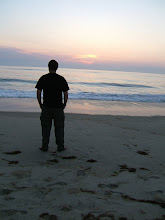
Turkmenistan is located right in the heart of Asia, just above Afghanistan, and above and to the right of Iran. In addition to these two, it borders Kazakhstan and Uzbekistan. During older times, it was one of the key countries along the Silk Road, containing ancient cities like
Merv, the largest city in the world during the 12th century. Various empires have fought over the land, from Alexander the Great, to Ghengis Khan, to the Tsarist Russians. The Turkmen, the largest ethnic group in Turkmenistan, are descendants of some of the original Turkic and Mongolian troopers who rode with the Mongols on their conquest of Asia back in the day (known affectionately as 'The Golden Horde'). Traditionally, the Turkmen people were nomads, but modernization and colonization has converted most, if not all, to the sedentary lifestyle.

Turkmen Nomad with Camel and Traditional Telepek Hat (I want one.)
The majority in Turkmenistan are Sunni Muslim, and were converted by Sufi Mystics rather than through conquest or other methods. As a result, Turkmen muslims tend to be more tolerant of other religions. Islam in Turkmenistan seems to be mostly 'unofficial', with religion being more of a personal issue than a communal one. While other countries in Central Asia have had violence between secular governments and Islamic fundamentalists, Turkmenistan has little to no history (that I can find) of such religious violence.
Fast forward to the early 20th century, when the Russians took over Turkmenistan as part of the Great Game, and began 'Europeanizing' it. When the Communist Revolution turned Russia into the Soviet Union, Turkmenistan became the Turkmen Soviet Socialist Republic. With the fall of the Soviet Union in 1991, much of the government apparatus remained the same, and Turkmenistan joined the Commonwealth of Independent States, (the new 5 Central Asian Republics). Sapurmurat Niyazov, the leader under Soviet Rule of the country, became the first president of the country. After his death in 2006, Gurbanguly Berdimuhamedow took over as president, and is the current leader of the country (so if you see these names in the news, you'll know it's from the place I'm at!)

Most of Turkmenistan (something like 80%) is covered by the Karakum Desert. Some issues with Soviet irrigation programs have lead to increased desertification in the country as some of the arable land was unintentionally salted by evaporating water. However, beneath the sand, lies one of the largest repositories of natural gas in the world. One of the biggest issues in the development of the country is finding a way to sell that gas to the outside world. Currently there's only one pipeline leading out of the country, and it goes through Russia. Unfortunately, they use their monopoly on the pipeline to charge Turkmenistan below market rates for the gas and can use it as leverage in just about every negotiation with their former territory. One of the things I hope I can help with as a Peace Corps Volunteer is helping Turkmen people learn English so they'll be better able to deal with Western companies and hopefully develop some new ways to sell natural gas to countries besides Russia, and get a fair price for the resource.
Because of the abundance of natural gas, almost every place in Turkmenistan has electricity, which is good news for me, because it means I can use my laptop to write and continue making movies. They actually have an overabundance of electricity, and sell some to both Kazakhstan and China.

For my first three months in the country, I'll be located in Asghabat, the capital of Turkmenistan. From there, we do intensive language training, and learn how to teach English and give Health advice. We'll also be going to some of the villages around Asghabat, so the Peace Corps can see how we perform in different settings. After training, when we're sworn in as Peace Corps Volunteers, they assign us to our permanent two year post. When that time comes around, I'll post here, so you can see exactly where in the world I'll be.
So that just about covers the basics of Turkmenistan, at least as I understand them so far. If you have any more questions, shoot me a comment or an e-mail. Keep in mind that this is all just book-smarts at this point; I haven't stepped foot in the country yet. I'm really curious how much of what I've read is true, and what it's really like there. When I find out, I'll let you know!
Peace,
-Ted


As far as I remember, Turkmenistan quit the CIS after a few years in a move to support the country's neutral status. Is that true? Is it still a nominal member?
ReplyDeleteTurkmenistan is an associate member, so it still participates while maintaining official neutrality.
ReplyDeleteHey Ted.
ReplyDeleteI noticed that your interests include film making?
myself and two friends will be crossing Turkmenistan in March 2010, making a film. would be cool to meet up, sounds like you know alot about the country.
hit me back on my gmail if your interested and ill go into more detail.
peace
Dylan